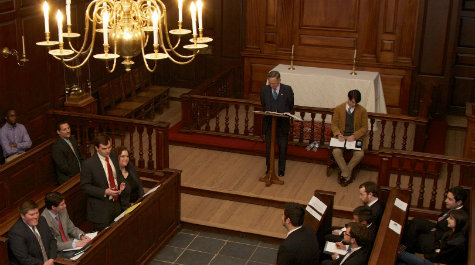A Tradition Continued: Law Students Host Mock Legislature
Members of William & Mary Law School's George Wythe Society gathered in the Wren Chapel on March 15 to take part in the Society's second annual Mock Legislature. The event, which was revived last year, continued a tradition started 230 years ago by Wythe, William & Mary's -- and the nation's - - first professor of law. Wythe believed that the exercise was an important part of legal education, because the Law School was founded for the express purpose of training political leaders to serve the fledgling nation.
Wythe Society President Dominick Littman J.D. '13 opened the session by introducing Sen. Tommy Norment, majority leader of the Senate of Virginia and a 1973 graduate of the Law School. Norment played the role of speaker, moderating the proceedings and ensuring that the rules of debate were followed.
Norment took to the lectern, thanking the students for attending and discussing the significance of the mock legislature tradition. He and the secretary quickly disposed of various procedural matters, which included convening the assembly for official business and explaining the ground rules for the debate. Norment then opened the floor up to the students, who introduced the topic to be discussed: whether the assembly should pass a bill to fund improvements to Virginia's transportation infrastructure by repealing the state gas tax and raising the sales tax.
Debate on the bill then commenced, with each side taking turns providing arguments for their respective positions on the issue. Although the debate was passionate and, at times, a little heated, the format of the proceedings kept interactions cordial. The legislators were not allowed to interrupt a speaker on their own -- they needed to first be recognized by Norment, who then asked the current presenter whether he or she would yield for a question. Legislators generally would yield to questioning.
This formality occasionally led to entertaining exchanges in which legislators would rise to ask additional questions before the speaker had a chance to address previously posed questions, but it always served a purpose. By avoiding direct confrontation and requiring each side to hear the other out, the system allowed for a more reasoned and respectful debate -- a testament to Wythe's original structure.
After about one hour of argument, Norment put the resolution to a vote. The legislators weren't the only ones voting -- every person in attendance was encouraged to participate. The secretary first counted the Ayes, then the Nays. The Ayes carried the vote, allowing the bill to pass.
Littman said he was pleased with the event this year. "I thought everyone was energetic and well-prepared for the debate," he said. "It was an honor to be able to carry on this great tradition."
